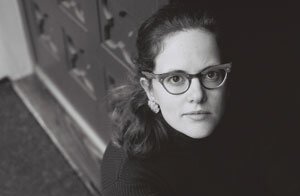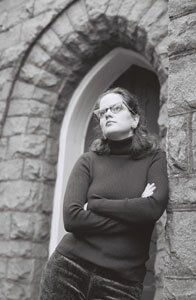Kosher to communion: Winner's path to Christ

Judging from her religious history, it's clear: when Lauren Winner does something, she does it all the way. When this daughter of a Jewish father and a lapsed Baptist mother decided to become more involved in Judaism as a 16-year-old college freshman, she didn't simply attend Friday services. She went all the way, officially converting to Judaism and practicing as an Orthodox Jew.
The move may have surprised her friends at Congregation Beth Israel on Jefferson Street, where during high school, Winner has said, she was "possibly the most involved teenager they had ever seen."
But after two years following the strict precepts of Judaism– including keeping kosher– she began to feel a spiritual pull in a different direction: toward Christianity.
"I had always been academically interested in Christianity," says Winner, "but over the years, it sort of morphed into also being a personal interest."
Though Winner was majoring in religious studies, she says her conversion transcended her academic pursuit. Instead, she says, it began with a dream she had during her sophomore year at Columbia.
"It seemed to be about Jesus," she says. Her discovery continued after she discovered a series of novels that follow the experiences of a small-town Episcopalian priest, Jan Karon's Mitford series.
"I was totally taken by them," she recalls. "I say it was God's sense of humor because I'm such an intellectual snob, and I have to say I was converted by middlebrow literature."
But leaving Judaism behind and embracing Christianity was easier said than done.
Still surrounded by her Orthodox Jewish friends in New York, "I didn't have the personal fortitude to do anything but read about Christianity," Winner says. But leaving New York to study abroad at Cambridge University gave her the distance she needed to take the next step.
"It was in England that I stopped flirting with this and committed to it," she recalls. "In hindsight, I see in a lot of people some relationship between geographical journeys and spiritual journeys. For me, I knew when I moved to England that I was going to go to church."
Once again, Winner went all the way, being baptized in the church of England and embracing evangelical Christianity.
She documented her conversion in her first book, Girl Meets God, and says putting her experience into print may have helped her friends and family understand her decision.
"Both of my parents said it was a privilege to read that," she says. "They got a window into what was going on in my life that I hadn't shared with them."
Other family members, who had a harder time accepting the change, hoped she might "grow out of it," she says. That book, followed by her 2002 "very churchy wedding" to fellow Christian Griff Gatewood, helped convince them of her sincerity, she believes.
While she says those who know her well understand her, she still encounters many misconceptions about her beliefs– and about evangelical Christians in general.
"There's been a very vocal group who have sought to say, 'If you're really a Christian, that means you have these particular political values,'" she says. Though Winner believes that the mainstream media have fostered the stereotype of evangelical Christians as right-wing nuts, she says her religious conversion was not accompanied by a political conversion.
"I was raised in a yellow dog Democratic household," she says, "and I still am one. I've never voted for a Republican."
Evangelical Christians, she explains, are defined by two things: a view of scripture as authoritative and an emphasis on a personal relationship with Jesus.
Another way Winner differs from some evangelical Christians is in the way she chooses to share the word of God. While spreading the gospel is a foundation of evangelicism, Winner doesn't usually do so in conversation with strangers.
Instead, she explains, "My personal writing does it."
And there has been plenty of it. Following Girl Meets God, Winner penned Mudhouse Sabbath (named for the Charlottesville coffeehouse), about the bond between Judaism and Christianity. However, it is her most recent book, Real Sex: The Truth about Chastity, that has generated the most buzz.
Though Winner lost her virginity at 15 and continued to have premarital sex into her 20s, her book encourages readers to wait for marriage and to hold sacred the depth of the union between a husband and wife.
Though she received offers from secular publishing houses, Winner says, she held out for a Christian publisher.
"I wrote it principally to engage a Christian audience," she says. "I didn't have an interest in converting the wider world to Christian sexual ethics." Even so, the book garnered national attention, receiving coverage in the Chicago Tribune and the New York Times.
Winner attributes part of its success to the fact that Real Sex has concepts that appeal to people from different religious backgrounds. "A lot of us can come together and say, 'I don't think it's good for my 14-year-old to be having oral sex with people she's known for three days,'" she says.
Now taking a break from book writing– and from her hometown– Winner is a guest lecturer in divinity at Duke University in Durham while completing her Ph.D. thesis for Columbia. She says she continues to push the limits of her faith.
"I'm still trying to figure out how to more and more thoroughly incorporate Christian practice into my life," she says. Although she teaches at a divinity school and is on the road every week lecturing about religion, she remains vigilant.
"I'm very wary of the dangers of becoming a professional Christian," she says. "When explicit pronouncements of your faith become how you pay your mortgage, you're in danger of things becoming stale and rote."
Somehow, it seems unlikely Winner will let that happen.

Lauren Winner
Lauren Winner has explored many facets of her religion through her writing.
FILE PHOTO BY JEN FARIELLO

Lauren Winner Winner says her religious conversion from Jew to evangelical Christian did not change her political views. "I've never voted for a Republican," she says.
FILE PHOTO BY JEN FARIELLO